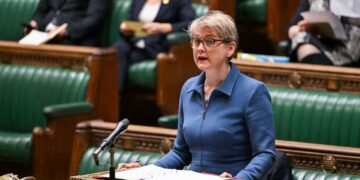By Ebi Kesiena
The United Kingdom has announced a major policy change reducing the post-study work visa period for international students, including Nigerians, from two years to 18 months.
The new rule, which will take effect in January 2027, was revealed by Home Secretary Shabana Mahmood as part of a broader immigration reform plan aimed at tightening migration controls while continuing to attract skilled global talent.
Mahmood said the reforms would also require immigrants to meet A-level English language standards to improve their integration into the UK workforce.
According to a statement on the UK government’s website, the decision to shorten the post-study period is intended to ensure international graduates contribute more effectively to the economy. The government said data showed that many graduates failed to secure graduate-level employment within the current two-year timeframe, prompting the change.
The policy forms part of the government’s flagship immigration white paper and “Plan for Change,” which includes a 32 percent rise in the Immigration Skills Charge (ISC), a levy paid by employers who sponsor skilled foreign workers. The increase, the first since 2017, will be channelled into training the domestic workforce to reduce dependence on overseas labour.
“The time for international students to find a graduate-level job after completing their studies will also be cut to 18 months from the current two years,” the statement read. “The immigration skills charge, which is paid by employers sponsoring skilled foreign workers and reinvested in training the domestic workforce, is being raised by 32 percent.”
The government said the reforms reflect a commitment to balancing tighter border control with the continued attraction of international talent.
In addition to the shortened work period, international students will now face stricter English language requirements for studying, working, and settling in the UK.
Tuition fees are also expected to increase. From the 2025/26 academic year, undergraduate fees will rise by 3.1 percent, from £9,250 to £9,535, adding to the financial pressure on overseas students.
The UK had already introduced tougher immigration rules in January 2024, barring most international students from bringing dependants unless they are enrolled in postgraduate research programmes or funded by government scholarships.
Recent figures suggest the stricter rules have led to a drop in the number of foreign students choosing the UK as their study destination.




































